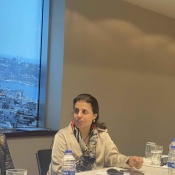Religion and Human Rights in the Palestinian Draft Constitution: Lessons Learnt from Experiences of Arab Spring Countries
Symposium
Religion
and Human Rights in the Palestinian Draft Constitution:
Lessons
Learnt from Experiences of Arab Spring Countries
The
Institute of Law, Birzeit University (Conference Hall 243)
20
December 2012
09:00 ndash; 09:30
Registration
nbsp;
09:30 ndash; 10:00
Opening Remarks
nbsp;
nbsp;
Birzeit University
Samia Haleila
NGO
Development Center
NDC Representative
The Institute of Law
Jamil Salem
nbsp;
10:00 ndash; 11:15
First Session
Religion and
the State: Past and Present
Chair: Islah Jad
This session analyses forms,
patterns and tools of integrating religion within the state affairs,
particularly through the constitutional text. It assesses how deep would
religion penetrate through the state functions. In addition to uncovering
ldquo;hues of secularismrdquo;, participants trace down major phases of the
relationship between religion and the state in the world in general, and in
the Arab region in specific. In this session, relevant developments are
reviewed on a worldwide level, or in certain regions or states, with a view
to assessing the influence of said approaches on the enjoyment of human
rights.
nbsp;
How Do States Usually
Deal with Religion in the Constitution?
Narmin Siam
nbsp;
Rediscovering Religion and Secularism
Majid Shihadeh
nbsp;
Religious Position towards the Constitution of anbsp; Civil State
Ali Al-Sartawi
nbsp;
Critique
Discussion
nbsp;
George Giacaman
11:15 ndash; 11:30 nbsp;
Coffee Break
nbsp;
nbsp;
11:30 ndash; 12:45
Second Session
Experience of Arab Countries
Chair: Randa Siniora
Presentations review the
current debate in Egypt and Tunisia, including a comparison of pre- and
post-revolution constitutional approaches pertaining to religion and state
issues. Discussants address results and consequences of various approaches to
deconstructing religion and human rights issues in the constitution.
Accordingly, opportunities furnished to citizens to enjoy their rights under
a variety of scenarios are assessed.
nbsp;
Religion in the Constitution in Arab Spring Countries
Ali Khashan
nbsp;
Problems of Integrating Religion within the
Constitution: A Comparative Approachnbsp;
Mohammed Khader
nbsp;
Problems of Integrating Religion within the
Constitution: The Tunisian Experience
Bastien Ballard
nbsp;
Critique
Discussion
nbsp;
Mudar Kassis
12:45 ndash; 13:00
Coffee Break
nbsp;
nbsp;
13:00 ndash; 14:15
Third Session
Palestinian
Experience
Chair: Mustafa Mari
This session seeks to
understand the Palestinian constitutional experience since the establishment
of the Palestinian National Authority, assessing whether Palestinians should
reconsider how to address issues in question in light of changes the region
has been witnessing since early 2011.
nbsp;
How Has the Issue of Religion been Dealt with
in the Palestinian Experience?
Jamal al Khatib
nbsp;
How Has the Issue of Religion been Dealt with
in the Basic Law?
Emilio Dabed
nbsp;
Entry-points to
Addressing Issues of Human Rights and Religion within the Constitution
Reem al Botmeh
nbsp;
Critique
Discussion
Asem Khalil
nbsp;
Conclusion
Basem Zubeidi
14:15
Lunch
nbsp;






